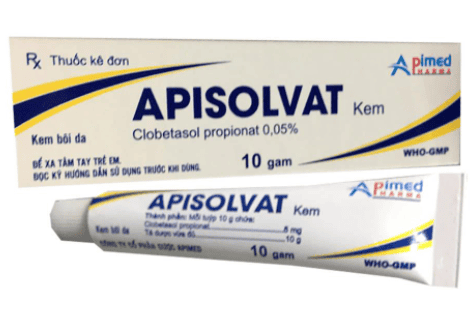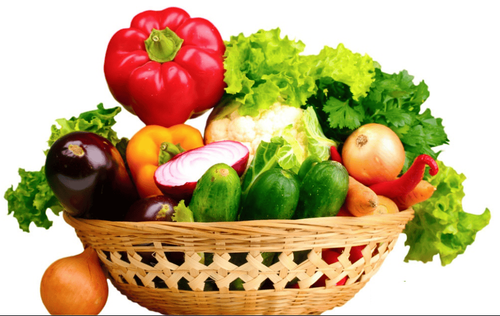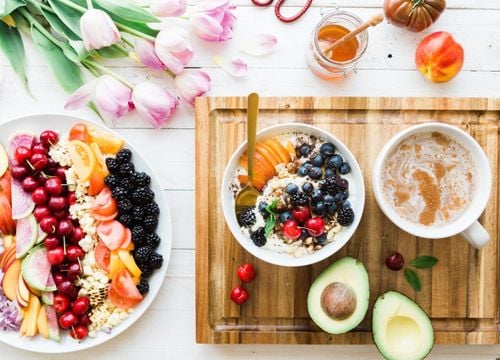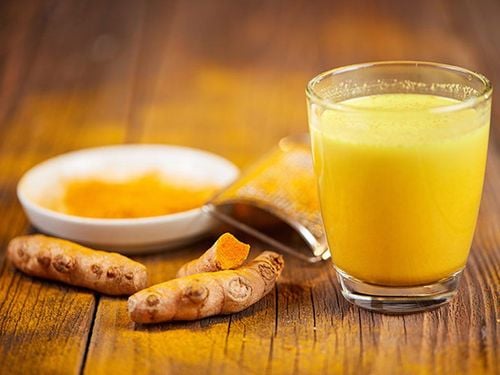This is an automatically translated article.
If you feel tired with insomnia, not sleeping well, trying one of these foods before bed can help you fall asleep faster. And the following article will provide information on the 9 best foods you should eat before going to bed.
1. Should you eat before going to bed? Advantages and disadvantages
There are mixed opinions when it comes to late-night snacking and whether it's healthy or not. The view of many scientists is that whether eating at night is beneficial or harmful depends on the type of food we consume. Many foods can improve sleep quality and aid in weight loss.
1.1. Advantages Advantages of eating before bed include weight loss, better sleep aid and blood sugar maintenance.
Lose weight
Even while sleeping, our body needs energy to function because it is in the process of recovering from the activities from the previous day. When we go to sleep with an empty stomach, the body will fall into a state of lack of energy; this results in the body retaining carbs and fat instead of using it for fuel. Choosing sleep-friendly snacks high in tryptophan and melatonin is not only good for us, but it also helps reduce hunger and gives the body the energy it needs to recover at night.
Tryptophan Supplement
Tryptophan is an amino acid that increases serotonin and melatonin levels in the body. Our bodies cannot produce tryptophan naturally — instead, we can only consume foods that contain tryptophan. Foods rich in tryptophan include milk, cheese, eggs, nuts, fish, and beans.
Melatonin Supplement
Melatonin is a hormone that regulates sleep by affecting the body's sleep-wake cycle. Melatonin production relies on exposure to light, no light will produce more melatonin. Good sources of melatonin include cherries, walnuts, bananas, oats, and tomatoes.
Sleep better
Eating enough will make us feel more sleepy but foods with nutritional value can give us a good night's sleep instead of indigestion. Healthy snacks like apples and peanut butter or avocado toast contain nutrients that are great for sleep.
Maintain blood sugar
Foods like fruits, nuts, oatmeal and whole wheat bread help regulate blood sugar. Low blood sugar has been linked to insomnia and next day fatigue. High blood sugar can disrupt sleep.
1.2. Cons The disadvantages of eating before bed include difficulty sleeping, slower metabolism, overeating, gastroesophageal reflux disease, indigestion, heartburn, and other health risks.
Poor sleep
Depending on what we eat and at what time of day, food can disrupt sleep. Foods that contain caffeine like chocolate and coffee will increase our energy levels and can keep us awake at night.
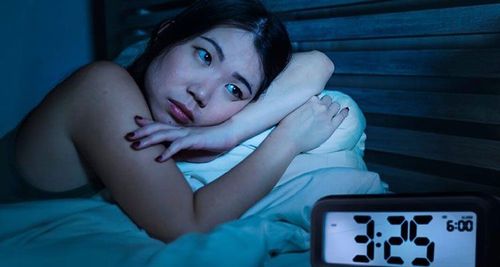
Ăn gì ngủ ngon là thắc mắc của nhiều người hiện nay.
Slower metabolism
Eating before bed can slow down the body's metabolism. The body slows down at night to prepare for sleep, but consuming foods, especially those high in carbs, can make it difficult for us to digest and lead to weight gain.
Increase portion sizes
People tend to be hungrier at night, leading to more food consumption. Instead of eating late at night and leaving less time for digestion, try to train yourself to eat more meals throughout the day. Many people may hear advice like “Eat breakfast like a king, lunch like a prince and dinner like a pauper” but that's exactly what you need to do to help stay healthy. weight and follow a healthy lifestyle.
Gastro-esophageal reflux and indigestion, heartburn
Another risk of eating multiple meals right before bedtime is gastroesophageal reflux, indigestion and heartburn. Giving the body time to digest before bed can reduce the risk of developing these problems. After eating and immediately going to bed to lie on a horizontal angle, the acid in the stomach can easily enter the esophagus and cause gastroesophageal reflux. Meanwhile, eating too much can make us feel indigestion before going to bed. Heartburn is a burning sensation in the chest caused by overeating and spicy food. Heartburn may be worse when lying down.
2. 9 best foods to eat before going to bed
2.1. Almonds Almonds are a tree nut that contains many health benefits. They are a great source of many nutrients. Eating almonds regularly can reduce the risk of several chronic diseases, such as type 2 diabetes and metabolic cardiovascular disease. This is attributed to their healthy source of monounsaturated fats, fiber and antioxidants. Antioxidants can protect your cells from the harmful inflammation that can lead to these chronic diseases.
It is claimed that almonds can also help enhance sleep quality. This is because almonds, along with other nuts, are a good source of the hormone melatonin. Melatonin helps regulate your body's internal clock and signals you to get ready for bed. Almonds are also an excellent source of magnesium, providing 19% of your daily needs in just 30 grams. Consuming enough magnesium can help improve sleep quality, especially for people with sleep disorders.
Magnesium's role in promoting sleep is thought to be related to its ability to reduce inflammation. Additionally, it may help reduce levels of the stress hormone cortisol, which is known to disrupt sleep
One study investigated the effects of feeding rats 400 milligrams (mg) of almond extract core. The scientists discovered that these mice slept longer and more deeply than those that did not use the almond extract.
2.2. Turkey Turkey is a very tasty and nutritious food. It contains a lot of protein. Protein is important for keeping muscles strong and regulating our appetite. In addition, turkey is a good source of several vitamins and minerals, such as vitamin B2 (riboflavin) and phosphorus. This is also a great source of selenium.
Most notably, turkey contains the amino acid tryptophan, which increases melatonin production. The protein in turkey may also contribute to its ability to promote feelings of fatigue. There is evidence that consuming moderate amounts of protein before bed is associated with better sleep quality, including fewer awakenings during the night. However, more research is still needed to confirm the potential role of turkey in improving sleep.

Gà tây là một trong các thực phẩm tốt cho giấc ngủ.
2.3. Chamomile Tea Chamomile tea is a popular herbal tea that may offer many health benefits. Chamomile tea is famous for its flavonoids. Flavones are a class of antioxidants that help reduce inflammation, a major cause of chronic diseases, such as cancer and heart disease. There's also some evidence that drinking chamomile tea can boost the immune system, reduce anxiety and depression, and improve skin health. Besides, chamomile tea has some unique properties that can improve sleep quality. Specifically, chamomile tea contains apigenin. This antioxidant binds to certain receptors in the brain that may promote feelings of sleepiness and reduce insomnia. Drinking chamomile tea before bed is definitely something worth trying if we want to improve the quality of our sleep.
2.4. Kiwi Kiwi is a low calorie and very nutritious fruit. One kiwi contains only 42 calories but contains a significant amount of nutrients, including 71% of the body's daily requirement for vitamin C. Kiwi also provides men and women with 23% and 31% of the vitamin K they need each day. Kiwi fruit contains large amounts of folate and potassium, as well as several trace minerals. Furthermore, eating kiwi may have benefits for digestive health, reducing inflammation and lowering cholesterol. These effects are due to the fact that they provide a large amount of fiber and carotenoid antioxidants.
According to studies on the ability to improve sleep quality, kiwi fruit is also likely to be one of the best foods to eat before you go to bed. In a 4-week study, 24 adults consumed two kiwis one hour before bedtime each night. At the end of the study, the participants fell asleep 42% faster than if they hadn't eaten anything before bed.
Kiwi's sleep-improving effects are attributed to serotonin. Serotonin is a brain chemical that helps regulate our sleep cycles. It is also thought that the anti-inflammatory antioxidants in kiwis, such as vitamin C and carotenoids, may be part of the reason the fruit can improve sleep.
2.5. Sour cherry juice Sour cherry juice has been shown to have some impressive health benefits. First, it provides adequate amounts of several important nutrients, such as magnesium and phosphorus. Cherry juice is also a very good source of potassium. In addition, it is a rich source of antioxidants, including anthocyanins and flavonols.
Sour cherry juice is also known to promote sleep and has even been studied for a role in reducing insomnia. For these reasons, drinking tart cherry juice before bed can improve our sleep quality.
The sleep promoting effect of tart cherry juice is due to the large amount of melatonin it contains. In a recent study, adults with insomnia drank 240ml of tart cherry juice twice a day for 2 weeks. They slept 84 minutes longer and reported better sleep quality than when they didn't drink the juice.
While these results are promising, more extensive research is still needed to confirm the role of tart cherry juice in improving your sleep and preventing insomnia. However, drinking some tart cherry juice before bed is something worth trying if you're struggling with insomnia or trouble sleeping at night.
2.6. Fatty fish Fatty fish such as salmon, tuna, and mackerel are very good for your health. What makes them even more unique is their exceptional amount of vitamin D. In addition, fatty fish is also high in healthy omega-3 fatty acids, namely eicosapentaenoic acid (EPA) and docosahexaenoic acid (DHA). EPA and DPA are known to reduce inflammation. Additionally, omega-3 fatty acids may protect against heart disease and promote brain health. The combination of omega-3 fatty acids and vitamin D in fatty fish has the potential to help enhance sleep quality, as both have been shown to increase serotonin production.
Eating a few ounces of fatty fish before bed can help us fall asleep faster and sleep more deeply. However, more research is still needed to draw firm conclusions about fatty fish's ability to improve sleep.
2.7. Walnuts Walnuts are a fairly common nut. They are packed with nutrients, providing more than 19 vitamins and minerals; In addition, there are 1.9 grams of fiber in a 28-gram serving. Walnuts are especially rich in magnesium, phosphorus, manganese and copper. Additionally, walnuts are a good source of healthy fats, including omega-3 fatty acids and linoleic acid. They also provide 4.3 grams of protein per 30 grams, which may be beneficial for reducing cravings.
Walnuts have also been shown to promote heart health. They have been studied for their ability to lower cholesterol levels, which is a major risk factor for heart disease. Furthermore, some researchers claim that eating walnuts improves sleep quality as they are one of the best food sources of melatonin.
The fatty acid composition of walnuts may also contribute to better sleep. They provide alpha-linolenic acid (ALA) and omega-3 fatty acids that are converted to DHA in the body. DHA may increase serotonin production.
There is not much evidence to support the hypothesis of improved sleep of walnuts. In fact, there haven't been any studies that specifically focus on their role in promoting sleep. However, they are still worth a try if you want a good night's sleep.

Quả óc chó thuộc nhóm thực phẩm tốt cho giấc ngủ.
2.8. Passion flower tea Passion flower tea is another traditional herbal tea used to treat a number of health related ailments. Passion fruit tea is a rich source of flavonoid antioxidants. Flavonoid antioxidants are known for their role in reducing inflammation, boosting immune health and reducing the risk of heart disease. In addition, passionflower tea has been studied for its ability to reduce stress and anxiety. The apigenin in passion fruit tea is an antioxidant that reduces anxiety. Apigenin produces a calming effect by binding to certain receptors in our brain. There is also some evidence that passionflower increases production of the brain chemical gamma aminobutyric acid (GABA). GABA works to inhibit other brain chemicals that cause stress, such as glutamate. The calming properties of passionflower tea can promote sleepiness, so we can drink it before bed.
2.9. White rice White rice is a grain widely consumed as a staple food in many countries, including Vietnam. The main difference between white rice and brown rice is that white rice has had the bran and germ removed. This makes it contain less fiber, nutrients and antioxidants. However, white rice still contains a large amount of vitamins and minerals.
White rice is high in carbs, providing 22 grams in a 79-gram serving. The carb and fiber content contribute to an increase in the glycemic index (GI). The glycemic index is a measure of how quickly a food raises our blood sugar. It has been suggested that eating foods with a high GI, such as white rice, at least 1 hour before bedtime can help improve sleep quality.
One study compared the sleep habits of 1,848 people based on whether they ate rice, bread or noodles. When you eat more rice, you will have better sleep than eating bread or noodles, including longer sleep time.
Getting enough sleep is very important for our health. Certain foods and drinks may be helpful for improving sleep quality. This is because they contain hormones that help regulate sleep and brain chemicals, such as melatonin and serotonin. Several other foods and drinks contain high amounts of antioxidants and nutrients including magnesium and melatonin, which are known to enhance sleep by helping us fall asleep faster or stay asleep. longer. To reap the benefits of sleep-enhancing foods, it's best to consume them 2-3 hours before bedtime. Eating right before bed can cause digestive problems, such as gastroesophageal reflux.
Please follow the website: Vinmec.com regularly to update many other useful information.
Please dial HOTLINE for more information or register for an appointment HERE. Download MyVinmec app to make appointments faster and to manage your bookings easily.
Reference sources: amerisleep.com, healthline.com



